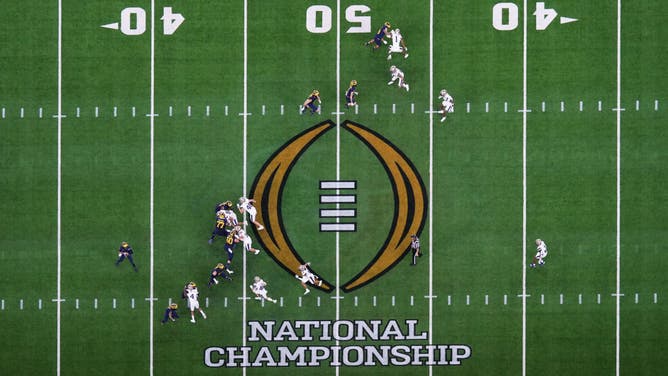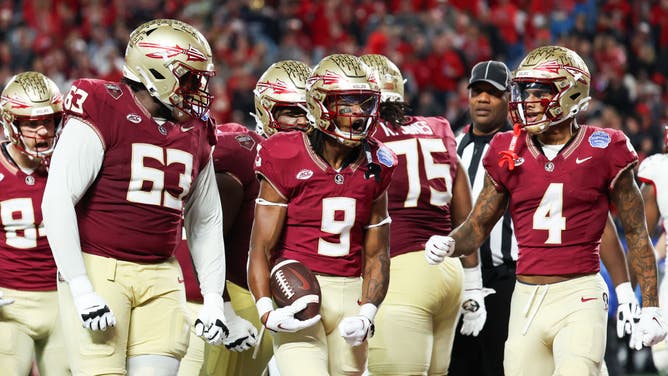College Football Playoff Leaders Expected To Agree To Monster Revenue Distribution Deal; SEC, Big Ten Cash-In
College Football Playoff committee members will finally agree to a new revenue distribution format on Friday, which will ultimately change the landscape of college athletics.
The new distribution model has been in the works for a number of months, with the SEC and Big Ten looking to cash-in on the number of powerhouse teams situated in their conferences. The holdup surrounding the amount of automatic qualifiers for each conference has been kicked down the road, with both mega-conferences realizing that to get the money, they'd have to back off the pursuit of automatic bids.
After meeting in Dallas, Indianapolis and virtually over the last several weeks, all sides have come to an agreement, even if the ACC and Big 12 aren't particularly happy with the final outcome.
Now, both major conferences are going to split upwards of 58% of the total revenue that the playoffs bring in on a yearly basis. Both conference schools will make over $20 million per year in the new agreement, which involves the massive contract with ESPN, that will have the network paying over $7 billion in the six-year contract. The SEC and Big Ten earnings could come out to around $760 million. Compare this to the ACC and Big 12 receiving in the neighborhood of $440 million, and you can see how the two power conferences hold all the weight, according to a number reported by Yahoo.
It's reported that each ACC school will make just over $13 million per year, while Big 12 schools will make $12 million per year in revenue distribution. One of the main points of contention surrounded the amount of money Notre Dame would make in this new model, which should come out to around $12 million per season.
For Group of Five schools, this was all about agreeing to be part of the party, with all four power conferences dangling a carrot over their head. At the end of the day, they could not turn down the opportunity to be a part of this playoff configuration, bringing in less than $2 million per year.
This has obviously drawn a lot of attention from other conference presidents and commissioners, but the Big 12 and ACC reportedly signed off on the agreement earlier in the week. This move led to the proposal being voted on and passed by committee members on Friday. Executive director Bill Hancock wanted to get this deal done so that the contract with ESPN could finally be signed, even if the amount of qualifiers for each conference was still being sorted.

HOUSTON, TEXAS - JANUARY 8: Michigan Wolverines quarterback J.J. McCarthy (9) drops back to pass during the national championship NCAA College Football Playoff game at NRG Stadium, Monday, Jan. 8, 2024, in Houston. (Elizabeth Conley/Houston Chronicle via Getty Images)
What started at four each for the SEC and Big Ten has gone down to one in recent talks. This road block was characterized a diversion by some, so that the ACC and Big 12, along with Group of Five members would concede on the revenue distribution model previously mentioned.
Now that the revenue part of this whole new deal has been finalized, with the SEC and Big Ten getting the bulk amount, talks will turn towards a format, along with who received a first-round bye. Both mega conferences have been eyeing the first round bye, but pushback from opposing conferences like the ACC and Big 12 forced this conversation to extend.
Where Will The ACC Go From Here If Teams Exit In Future?
This is the question that has folks scratching their heads. The ACC and Florida State are set to meet twice in courtrooms over the next two months, once in Florida and North Carolina. If the Seminoles find a way out of the ACC's Grant of Rights, other schools could follow, which would lead to another round of negotiations within the college football playoff committee boardroom.

CHARLOTTE, NORTH CAROLINA - DECEMBER 2: Lawrance Toafili #9 of the Florida State Seminoles celebrates with the team after scoring a touchdown in the third quarter against the Louisville Cardinals during the ACC Championship at Bank of America Stadium on December 2, 2023 in Charlotte, North Carolina. (Photo by Isaiah Vazquez/Getty Images)
The only solution that could come from this would be that the teams exiting the ACC would have to deal with a lesser amount of money to join either the SEC or Big Ten. The current model would see both the ACC and Big 12 take a hit if lets say Florida State was joined by Clemson, Miami, or North Carolina, just to name a few.
Next Up, Get This Deal Done With ESPN
One of the final portions of this deal that is ecpected to be completed is the televsion agreement with ESPN. With the network ready to spend almost $1.3 billion per year, and would run for a total of six years. This new deal with ESPN is scheduled to begin in 2026, with the 14-team format still being discussed between all parties. What is obviously known is that the playoff format will be changing, and we are doing this before the 12-team playoff even gets off the ground.
At the end of the day, there is no reason for the television contract to sit unsigned. The committee will end up finalizing the agreement, then members will decided on how many automatic qualifiers or first round byes each conference would get.
But the main concern for these conferences was getting the financial part agreed to, and now they will worry about the format, which could also be completed in next 48 hours, or longer.